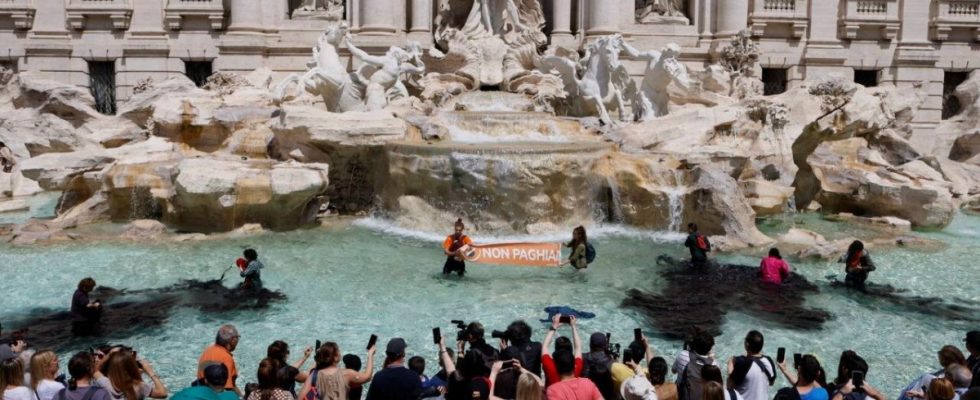Climate activists climbed into Rome’s Trevi Fountain and dumped black liquid into the water. With their action at Rome’s tourist hotspot, members of the group Ultima Generazione (Last Generation) called for “an immediate end to public subsidies for all fossil fuels,” according to a statement.
Four activists poured charcoal diluted with water into the well and displayed banners. They were then arrested by the police and taken away, as can be seen in pictures and videos.
A police officer leads an activists out of the Trevi Fountain.
(Photo: Mauro Scrobogna/dpa)
The group also protested against the Italian government, which is doing too little to protect the climate. Among other things, this is “the cause of the climate crisis that has hit Emilia-Romagna and Marche in the past few days”. After heavy rains, the area was flooded with at least 14 people dead.
Rome’s Mayor Roberto Gualtieri sharply condemned the protest attack on the Trevi Fountain. The perpetrators damaged valuable monuments and harmed the environment, he said. The police and fire brigade were distracted from other important tasks for hours; Gualtieri explained that 300,000 liters of water would have to be replaced and a lot of energy would have to be used to limit the damage. “You can protest, it’s legitimate and even necessary. But not in this way! It’s dangerous and harmful and destroys valuable cultural assets that belong to the general public.”
With a width of almost 50 meters and a monumental travertine facade 25 meters high, the Trevi Fountain is the largest fountain in Rome and one of the most famous in the world. In the film “La Dolce Vita” Anita Ekberg and Marcello Mastroianni once climbed into the pool at night – meanwhile, high penalties are imposed for such baths, and the fountain is also secured by police officers.
Government announces tougher pace
The activists have already demonstrated in other famous Italian locations. They poured something like black liquid into a fountain on the Spanish Steps in Rome. They also daubed orange paint on the facade of the Palazzo Vecchio in Florence. Works of art have also been the target of the activists.
In view of these actions, Italy’s government announced a tougher approach. She wants to punish vandalism of cultural assets with the payment of damages in the amount of 10,000 to 60,000 euros and criminal sanctions more severely.
Minister of Culture Gennaro Sangiuliano called for a law against “eco-vandalism”. In the future, the polluters would have to bear the costs of repairing the damage. The non-partisan Sangiuliano announced that his ministry would participate in an indictment against the perpetrators as a joint prosecutor.

